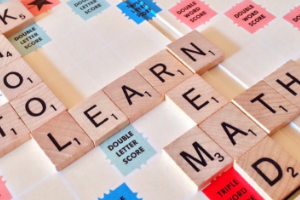“Why do children dread mathematics? Because of the wrong approach. Because it is look at as a subject.” ~ Shakuntala Devi
While most parenting topics generate a myriad of conflicting opinions, there has always been one thing parents can agree on — reading to your child early and often will help him or her later in life.
 As a self-diagnosed right-brained person, I have always felt comfortable “raising readers”. I used to work in children’s publishing, for goodness’ sake. Reading, literacy, and books are my sweet spot.
As a self-diagnosed right-brained person, I have always felt comfortable “raising readers”. I used to work in children’s publishing, for goodness’ sake. Reading, literacy, and books are my sweet spot.
But recently, an article about the importance of teaching children math at an early age caught my eye. The article featured Kent Haines and Games for Young Minds, the weekly newsletter he created with the goal to help both parents and children “learn to love math through the power of play”.
After reading the article, I talked with Haines to ask him more about Games for Young Minds and his thoughts on the importance of incorporating early math, both as a parent and a math teacher.
Haines, a parent of three, and a middle school math teacher, came up with the concept for his newsletter, Games for Young Minds, after he began researching ways to incorporate early math in his own home. Through his research, Haines found that more so than reading, early performance in math is a better predictor of a child’s later academic success across the board.
Great, but how do parents encourage early math learning at home? you may ask. That’s the same question Haines had. The answer — games.
* * *
To learn more about Haines’s rule of thumb when it comes to teaching early math, why games are the key to teaching children math, how your family can learn to play with math in mind, and how to sign up for the Games for Young Minds newsletter, check out my latest post on the Birmingham Moms Blog.
Game on.